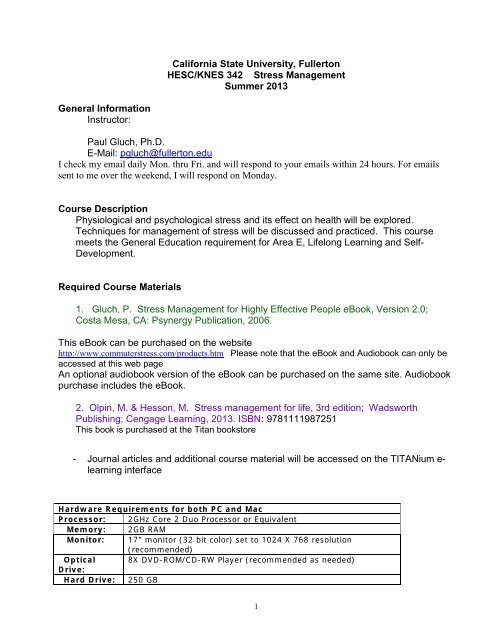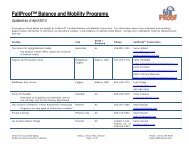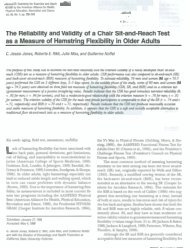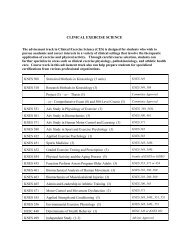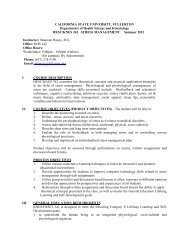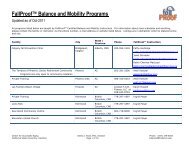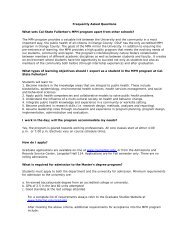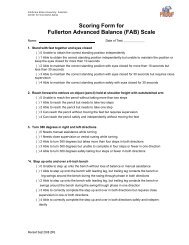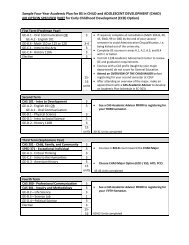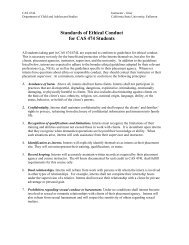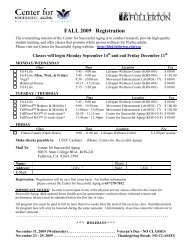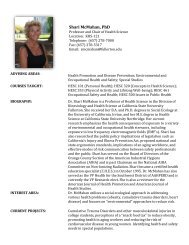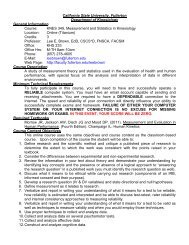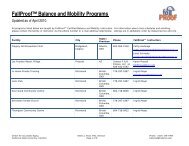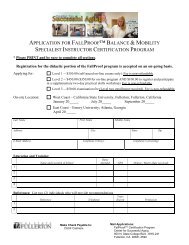Stress Management HESC 342 - California State University, Fullerton
Stress Management HESC 342 - California State University, Fullerton
Stress Management HESC 342 - California State University, Fullerton
Create successful ePaper yourself
Turn your PDF publications into a flip-book with our unique Google optimized e-Paper software.
General Information<br />
Instructor:<br />
<strong>California</strong> <strong>State</strong> <strong>University</strong>, <strong>Fullerton</strong><br />
<strong>HESC</strong>/KNES <strong>342</strong> <strong>Stress</strong> <strong>Management</strong><br />
Summer 2013<br />
Paul Gluch, Ph.D.<br />
E-Mail: pgluch@fullerton.edu<br />
I check my email daily Mon. thru Fri. and will respond to your emails within 24 hours. For emails<br />
sent to me over the weekend, I will respond on Monday.<br />
Course Description<br />
Physiological and psychological stress and its effect on health will be explored.<br />
Techniques for management of stress will be discussed and practiced. This course<br />
meets the General Education requirement for Area E, Lifelong Learning and Self-<br />
Development.<br />
Required Course Materials<br />
1. Gluch, P. <strong>Stress</strong> <strong>Management</strong> for Highly Effective People eBook, Version 2.0;<br />
Costa Mesa, CA: Psynergy Publication, 2006.<br />
This eBook can be purchased on the website<br />
http://www.commuterstress.com/products.htm Please note that the eBook and Audiobook can only be<br />
accessed at this web page<br />
An optional audiobook version of the eBook can be purchased on the same site. Audiobook<br />
purchase includes the eBook.<br />
2. Olpin, M. & Hesson, M. <strong>Stress</strong> management for life, 3rd edition; Wadsworth<br />
Publishing; Cengage Learning, 2013. ISBN: 9781111987251<br />
This book is purchased at the Titan bookstore<br />
- Journal articles and additional course material will be accessed on the TITANium elearning<br />
interface<br />
Hardware Requirements for both PC and Mac<br />
Processor: 2GHz Core 2 Duo Processor or Equivalent<br />
Memory: 2GB RAM<br />
Monitor: 17" monitor (32 bit color) set to 1024 X 768 resolution<br />
(recommended)<br />
Optical<br />
Drive:<br />
8X DVD-ROM/CD-RW Player (recommended as needed)<br />
Hard Drive: 250 GB<br />
1
Network: Ethernet 10/100<br />
Sound: Speakers<br />
Printer: Inkjet or laser printer<br />
Software Requirements<br />
Operating (PC) Windows 7 Service Pack 1 32-bit<br />
System: (Mac) Mac OSX 10.5.11<br />
MS Office: (PC) Microsoft Office 2007 software package<br />
(Mac) Microsoft Office 2008<br />
Or compatible software program<br />
Anti-Virus: Current Anti-Virus software updated monthly (preferred Microsoft<br />
Security Essentials).<br />
Web (PC) Microsoft Internet Explorer 9 or higher, Mozilla Firefox 5 or<br />
Browser: higher, and Google Chrome.<br />
(Mac) Mozilla Firefox 5 or higher, Safari and Google Chrome.<br />
• Do not use the AOL Web browser or any other type<br />
of proprietary Web browser, as they typically time<br />
you out when completing Titanium assignments.<br />
Plug-ins: Adobe Acrobat Reader, Adobe Flash Player, Java, Apple Quick<br />
Time<br />
Internet Reliable Internet availability from home via an Internet Service<br />
Service Provider (ISP) is required. Internet access at work may not<br />
Provider: allow enough time to complete assignments. "Firewalls" may<br />
impede access to online courses from work and also from home.<br />
Email: Email account must be able to send and receive attachments up<br />
to 5Mb in size.<br />
Skills: You should be proficient in using the World Wide Web and email.<br />
You are required to have an e-mail address; your CSUF email<br />
account is sufficient. You should be proficient in Word<br />
Processing: attachments, spell check, copy and paste, etc.<br />
Appropriate Online Behavior:<br />
See Netiquette guidelines at:<br />
http://www.albion.com/netiquette/corerules.html<br />
Course Objectives<br />
a. To understand the physiological and psychological effects of stress<br />
b. To understand somatic and behavioral techniques in dealing with stress<br />
c. To apply stress management concepts through experiential learning<br />
2
Course Content Outline:<br />
1. The nature of stress - positive and negative effects of stress<br />
2. Causes of stress - physiological, psychological, social/financial, environmental, and<br />
philosophical stressors.<br />
3. Consequences of stress – effects of chronic-level stress on physiology; the<br />
performance/activation relationship<br />
4. Communication – gender differences; active listening; assertiveness; public speaking<br />
stress<br />
5. Constructive stress management; controlling stressors; proactivity; the importance of<br />
awareness<br />
6. Mind/body stress management techniques; relaxation; exercise and stress;<br />
meditation<br />
7. Behavioral stress management techniques; goal setting; time management;<br />
8. Cognitive stress management techniques; interpretation and perception of stressors;<br />
visualization; self-talk monitoring; affirmations; meditation<br />
9. Resiliency – Using your physical, mental/emotional, and spiritual resources to thrive<br />
and self-actualize.<br />
Course Process Objectives:<br />
Through active participation in the various components of this course, the student will:<br />
1. Develop an understanding of how we experience distress and eustress.<br />
2. Understand that our stress management ability begins with taking responsibility for<br />
our thoughts, our feelings, and behaviors.<br />
3. Increase his or her ability to identify stressors as well as the physical, mental, and<br />
behavioral manifestations of stress<br />
4. Develop the ability to take control of their stress response via changes in<br />
mental/emotional, physical, and spiritual processes<br />
5. Increase awareness of their self-talk and irrational thinking patterns.<br />
6. Appreciate that changes in life are constant, and that much of the stress we<br />
experience is the result of how we interpret those changes<br />
7. Demonstrate, through discussion board forums and written assignments, the ability to<br />
apply the concepts contained within the Course Content<br />
Course Information:<br />
A. Make-up Assignments: Arrangements can be made for make-up work in advance of the<br />
due date for the assignment or journal entry.<br />
B. No extra credit assignments or journal entries will be given.<br />
C. Academic honesty is the expectation of the instructors. Refer to <strong>University</strong> policy in the<br />
course catalog. <strong>University</strong> policy on academic dishonesty will be upheld as it relates to<br />
exams and assignments required in this class (UPS 300.02). Action may range from<br />
reprimand to a grade of F. Please refer to the current catalog for a description of this policy.<br />
D. Disability or Special Needs: Please inform the instructor during the first week of<br />
3
classes about any disability or special needs that you have that may require<br />
specific arrangements related to class assignments, writing papers, or completing<br />
examinations. According to <strong>California</strong> <strong>State</strong> <strong>University</strong> Policy, students with<br />
disabilities need to document their disabilities at the Disabled Student Services<br />
Office.<br />
For back-up, keep personal copies of all work submitted on TITANium.<br />
Assignments/<strong>Stress</strong> Journal/Discussion Board Forums/Exams<br />
Your work in the course will be evaluated through written assignments, a <strong>Stress</strong> Journal,<br />
participation in discussion board forums, and exams. A description of each of these will be<br />
posted online as they are assigned. Due dates are below.<br />
Exams:<br />
Exam 1 June 20 - June 21<br />
Exam 2 July 11 – July 12<br />
Exam 3 July 25 – July 26<br />
Assignment Due Dates:<br />
Mission <strong>State</strong>ment – June 24<br />
Time <strong>Management</strong> – July 1<br />
Beliefs Inventory/REBT – July 15<br />
Communication – July 23<br />
<strong>Stress</strong> Journal Due Date:<br />
<strong>Stress</strong> Journal – July 26<br />
Last day for submitting late assignments: July 23<br />
Discussion Board Forums (DBFs):<br />
DBFs will initiate on Monday evenings (except for the Week 1 ungraded DBF). Dates for<br />
DBF initiation are posted throughout the semester in Course Documents. They will conclude<br />
the following Monday at 11:30 p.m.<br />
Activity: Description: Possible Points:<br />
Exams Three exams: Exam 1 worth<br />
19.25 pts; Exam 2 worth 19.5<br />
pts; Exam 3 worth 13.25 pts<br />
52 points total<br />
Assignments Four 7-point assignments:<br />
Mission <strong>State</strong>ment; Time<br />
<strong>Management</strong>; Beliefs<br />
Inventory/REBT; Communication<br />
28 points total<br />
<strong>Stress</strong> <strong>Management</strong> Submitted at the end of the 8- 15 points total<br />
Journal<br />
week course<br />
Discussion Board 6 Discussion Board Forums<br />
12 points total<br />
Forum (DBF) (DBFs) (ea. worth up to 2 points)<br />
Total Points 107 points<br />
4
Exams: 52 points. There will be three exams. Each exam is separate from the other two.<br />
Exam 1 will cover weeks 1 thru 3; exam 2 will cover weeks 4,5 and 6 ; exam 3 will cover<br />
weeks 7 and 8.<br />
Assignments: 28 points. There will be four 7-point assignments: Mission <strong>State</strong>ment; Time<br />
<strong>Management</strong>; Beliefs Inventory/REBT; Communication<br />
Minimum requirement for a course grade of “A” or “B” is submitting ALL FOUR of these 7point<br />
assignments, each one earning a passing grade. In order to pass the course, at least<br />
three of the four assignments must be submitted with a passing grade.<br />
Missing more than one assignment will result in a “WU” grade. The WU equates to an F in<br />
grade point averages. An “I” grade (Incomplete) is granted only in unusual circumstances.<br />
For each assignment, one point will be taken off for each day late up to the maximum<br />
number of points.<br />
Assignments may be submitted one time only. If you do not submit a completed<br />
assignment, answering all questions, you are ineligible to earn all the available points.<br />
Resubmitting the assignment or journal entry is not permitted.<br />
Discussion Board Forum Participation: 12 points<br />
Participation is a key component of this course. It is expected that you will be an<br />
active member of the discussion forums. You will be asked to contribute original<br />
responses to the weekly discussions, and respond to those made by others in the<br />
class. On-line participation will be tracked through a log and copies of online<br />
discussions.<br />
Student participation Guidelines:<br />
You must post a response to the question addressed in each forum as well as reply to at<br />
least one students’ comment in order to receive the full 2 -point credit. This is a minimum<br />
requirement. You may reply to more than one student’s comment and are encouraged to<br />
do so as it lends itself to the intellectual stimulation that is possible with online discussions.<br />
Postings or comments that only offer “me, too” or “I agree” substance will not be counted<br />
toward your full participation in the discussion forums. You need to take it a step further by<br />
adding something substantial; i.e., add an insight about the topic or something related to the<br />
topic.<br />
Postings after the DBF has concluded will earn ZERO points.<br />
<strong>Stress</strong> Journal: 15 points<br />
Criteria for assessment of <strong>Stress</strong>-Journal Entries:<br />
Excellent Journaling: (14 or 15 possible points)<br />
• Reflection is evident;<br />
• Demonstrates understanding and clearly addresses all questions/issues of the<br />
journal-entry topics;<br />
• Ideas presented clearly integrate concepts covered; and<br />
• Completed by the due date<br />
5
Average Journaling: (10 to 13 possible points)<br />
• Reflection is evident;<br />
• Demonstrates understanding and addresses some of the questions/issues of the<br />
journal-entry topics;<br />
• Ideas presented do not fully integrate concepts covered;<br />
• Not completed by the due date<br />
Below Average Journaling: (less than 10 points)<br />
• Reflection is evident;<br />
• Demonstrates understanding and addresses some of the questions/issues of the<br />
journal-entry topics;<br />
• Ideas presented do not fully integrate concepts covered;<br />
• Not completed by the due date<br />
Grading:<br />
A 93.00% - 100%<br />
A- 90.00% - 92.99%<br />
B+ 87.00% - 89.99%<br />
B 83.00% - 86.99%<br />
B- 80.00% - 82.99%<br />
C+ 77.00% - 79.99%<br />
C 73.00% - 76.99%<br />
C- 70.00% - 72.99%<br />
D 60.00% - 69.99%<br />
F Less than 60%<br />
Helpful Phone numbers and contacts:<br />
• CSUF Student Help Desk for Technical problems: 657-278-7777<br />
• URL of Titan Help: http://www.fullerton.edu/IT/help/index.asp<br />
• URL Student Titanium resources: http://oasis.fullerton.edu/resources.aspx<br />
You will find information there on how to use TITANium.<br />
• Pollack Library Guidelines for online instruction:<br />
http://www.library.fullerton.edu/ASP/libtemplate.aspx?version=2&contentpage=../content/documents/Guidelines-<br />
OnlineInstruction-30Aug12.pdf<br />
• If you purchase a digital version of the Olpin/Hesson text, you can contact tech<br />
support at www.UDTeBook.com/help<br />
Email: helpdesk@fullerton.edu<br />
Academic honesty: Academic honesty is the expectation of the instructors. Refer to<br />
<strong>University</strong> policy in the course catalog.<br />
6
Tentative Class Schedule/Outline<br />
Week Topic Readings<br />
1 • JUNE 3<br />
• The Nature of <strong>Stress</strong><br />
• Physiology of <strong>Stress</strong><br />
• General Adaptation Syndrome<br />
• Chronic <strong>Stress</strong> and Disease<br />
• Wellness Dimensions<br />
2 • JUNE 10<br />
• Awareness Training<br />
• Performance/Arousal Relationship<br />
• Relaxation<br />
• Mind/Body Interaction<br />
• Mindfulness<br />
3 • JUNE 17<br />
• EXAM 1<br />
• Mission <strong>State</strong>ment<br />
• Values Clarification<br />
• Imagery/Visualization<br />
• Law of Attraction<br />
4 • JUNE 24<br />
• Time <strong>Management</strong>/Goal Setting<br />
• Finances and <strong>Stress</strong><br />
• Proactivity and Reactivity<br />
5 • JULY 1<br />
• Managing Emotions<br />
• Paradigms<br />
6 • JULY 8<br />
• EXAM 2<br />
• Irrational Thinking<br />
• Beliefs Inventory<br />
• Self-Talk<br />
• Affirmations<br />
7 • JULY 15<br />
• Communication<br />
• Active Listening<br />
• Assertiveness<br />
• Gender differences in stress responses<br />
• Exercise<br />
8 • JULY 22<br />
• EXAM 3<br />
• Submit <strong>Stress</strong> Journal<br />
• Spirituality and <strong>Stress</strong><br />
• Meditation<br />
7<br />
• Gluch eBook Ch. 1 “Introduction”<br />
• Olpin/Hesson Ch. 14 “Creating a Healing<br />
Environment”<br />
• Olpin/Hesson Ch. 15 “Healthy Lifestyles”<br />
• Holmes-Rahe doc<br />
• Gluch eBook Ch. 2 “Awareness”<br />
• Gluch eBook Ch. 3 “Relaxation”<br />
• Olpin/Hesson Ch. 4 “The Mind/Body<br />
Connection”<br />
• Olpin/Hesson Ch. 7 “Mindfulness”<br />
• Gluch eBook Ch. 4 “The Mission”<br />
• Gluch eBook Ch. “Law of Attraction”<br />
• Olpin/Hesson Ch. 9 “The Importance of<br />
Values”<br />
• Olpin/Hesson Ch. 20 “Guided Imagery”<br />
• Gluch eBook Ch. 6 “Time <strong>Management</strong>”<br />
• Gluch eBook Ch. 7 “Proactivity<br />
• Olpin/Hesson Ch. 12 “ Money Matters”<br />
• Gluch eBook Ch. 11, “Paradigms”<br />
• Olpin/Hesson Ch. 8 “Managing<br />
Emotions”<br />
• Gluch eBook Ch. 10 “Irrational<br />
Thinking”<br />
• Gluch eBook Ch. 12 “Self-talk”<br />
• Olpin/Hesson Ch. 13 “Social Support,<br />
Relationships, & Communication”<br />
• Gluch eBook Ch. 13, “Communication”<br />
• Gluch eBook Ch. 14 “Increasing<br />
Arousal/Exercise”<br />
• Female <strong>Stress</strong> Response doc<br />
• Gluch eBook Ch. 8 “Meditation”<br />
• Gluch eBook Ch. 9 “Spirituality and<br />
<strong>Stress</strong>”<br />
• Olpin/Hesson Ch. 10 “Spirituality”


